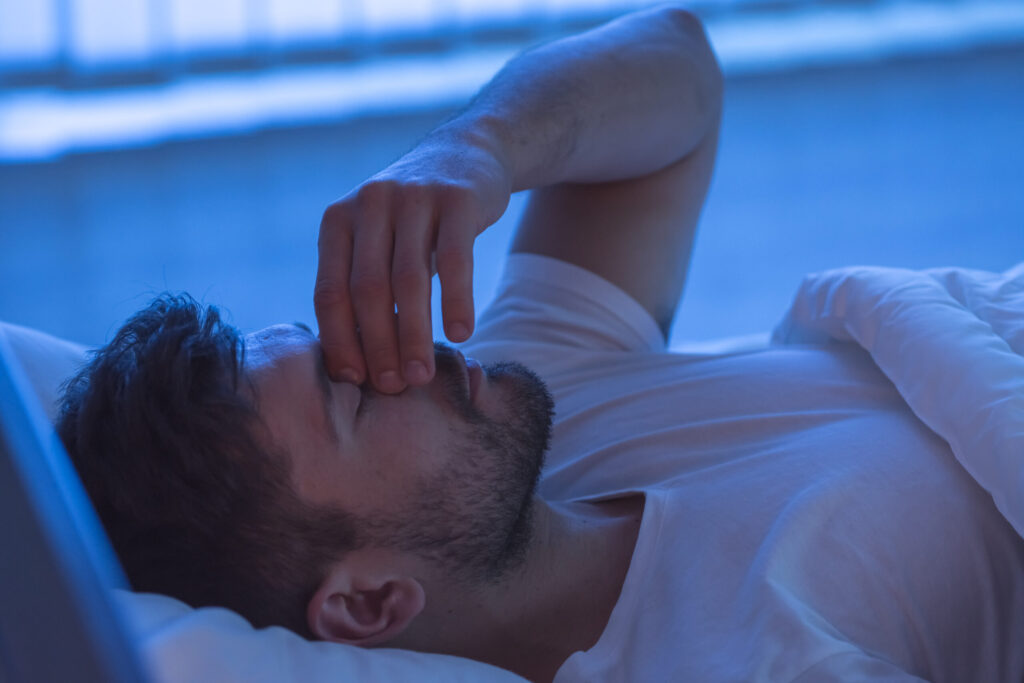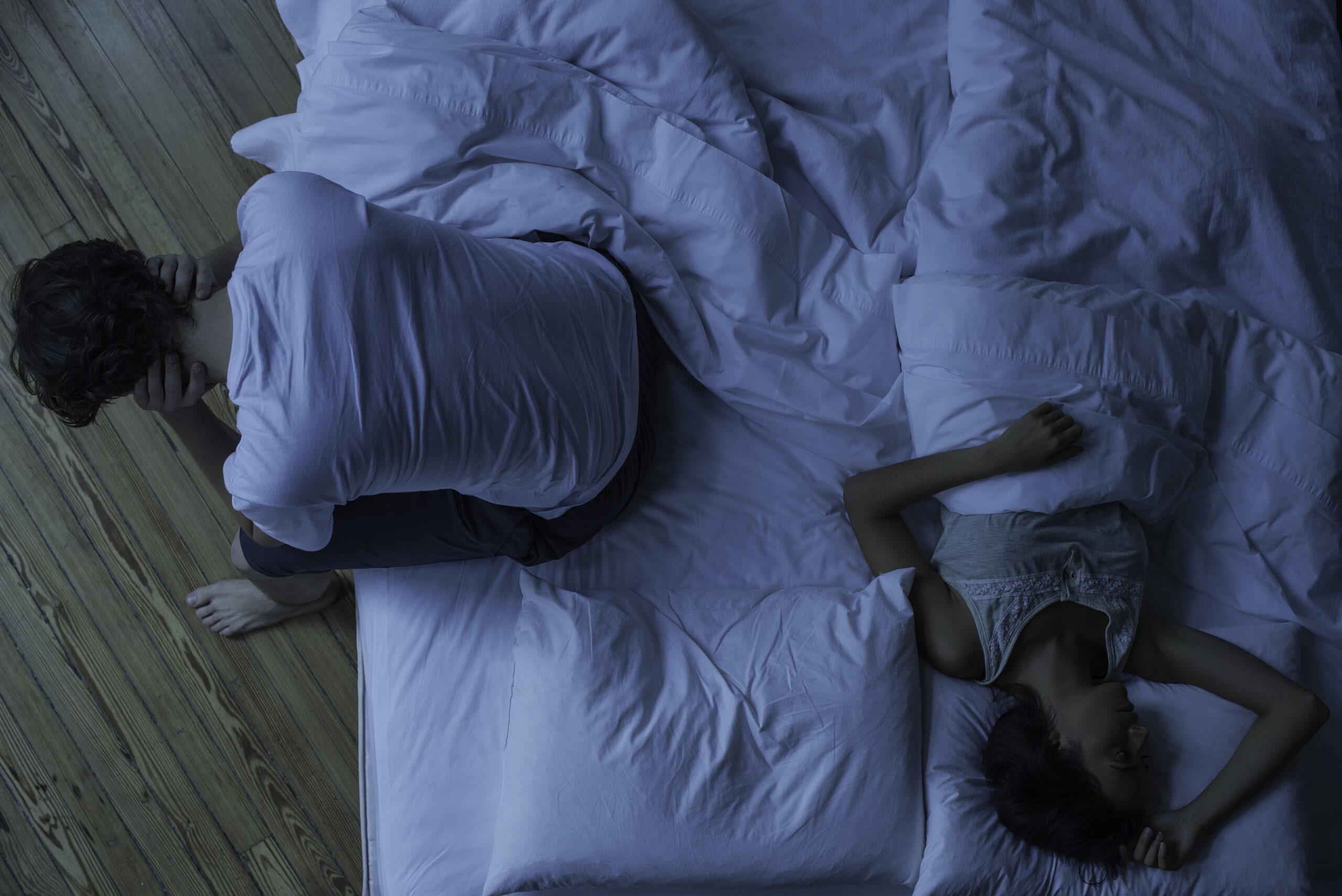In today’s fast-paced world, sleep often takes a backseat to work, screens, and stress. But what if those restless nights are doing more than just leaving you tired?
For many men, low energy, reduced muscle mass, and a fading sex drive might not just be signs of aging—they could be signs that sleep deprivation is messing with your testosterone levels. Testosterone, the vital hormone that fuels everything from mood to muscle, is heavily influenced by the quality and quantity of your sleep.
Recommended: Why Do My Erections Disappear During Foreplay?
In this blog, we’ll dive into the science linking sleep and testosterone, explore what happens when you don’t get enough rest, and share practical tips to help you reclaim both your sleep and your hormone health.
What Happens to Testosterone During Deep Sleep?
Testosterone production is closely tied to your sleep cycle—especially the deep, restorative stages. Most testosterone release in men occurs during REM (rapid eye movement) and slow-wave (deep) sleep, which typically happens in the first half of the night. As you move through these stages, your body enters a state of hormonal recovery and repair, during which testosterone levels rise significantly.

In fact, research shows that testosterone begins to increase shortly after you fall asleep, peaking during your first bout of deep sleep. If your sleep is short, interrupted, or poor in quality, you may miss out on these crucial phases—meaning your testosterone levels never get the boost they need.
Recommended: How to Make Sperm Stronger for Pregnancy
Deep sleep also reduces cortisol, the stress hormone that can suppress testosterone. So, not only does deep sleep help increase testosterone, but it also helps protect it from being broken down by stress. Without enough time in deep sleep, your body can’t fully regenerate, and over time, this can lead to chronically low testosterone, affecting everything from muscle growth to mood, libido, and even mental clarity.
How Much Sleep Do You Need to Maintain Healthy Testosterone Levels?
When it comes to testosterone, quality and quantity of sleep both matter. Studies have shown that getting less than 5 to 6 hours of sleep per night can cause a significant drop in testosterone levels—sometimes by as much as 10–15% in just one week. That’s a major hit to your hormones just from skimping on rest.
So, what’s the sweet spot? Most health experts and endocrinologists agree that 7 to 9 hours of uninterrupted sleep per night is ideal for healthy hormone function, including optimal testosterone production. This amount allows your body to cycle through all the important sleep stages—particularly slow-wave sleep, where most testosterone is released.
It’s also important to note that sleep timing matters. Going to bed at inconsistent hours or staying up too late can disrupt your circadian rhythm, which is closely tied to your body’s hormone release schedule. In short: pulling all-nighters, binge-watching shows, or constantly changing your sleep schedule can mess with your natural testosterone rhythm.
Recommended: Best Foods to Increase Sperm Count and Motility
If you want to keep your testosterone levels steady, make sleep a non-negotiable part of your health routine—just like diet and exercise.
Signs Your Low Testosterone Might Be Linked to Poor Sleep
Sometimes, the symptoms of low testosterone sneak in gradually, and sleep is often the silent culprit behind them. If you’ve been burning the candle at both ends or struggling with restless nights, here are some key signs that your testosterone levels might be taking a hit as a result:
1. Constant Fatigue
Even after a full night’s rest, you still feel drained. This could be due to shallow or poor-quality sleep affecting hormone production.
2. Low Sex Drive
A noticeable drop in libido is one of the most common signs of low testosterone—and insufficient sleep can directly suppress your sex hormones.
3. Mood Changes
Increased irritability, anxiety, or even depression may be linked to both poor sleep and low T. Sleep helps regulate emotional and hormonal balance.
4. Loss of Muscle Mass
Struggling to build or maintain muscle despite working out? Without enough testosterone—especially if deep sleep is lacking—your recovery and gains can suffer.
Recommended: Diet Tips for Naturally Improving Male Performance
5. Increased Body Fat
Low T is associated with higher fat storage, especially around the belly. Sleep deprivation also increases cravings for unhealthy foods, creating a vicious cycle.
6. Brain Fog and Poor Focus
Testosterone supports cognitive function. If you’re feeling mentally sluggish, it might be more than just a bad night’s rest—it could be a hormonal imbalance fueled by poor sleep.
7. Erectile Dysfunction
Though many factors contribute to ED, low testosterone caused by poor sleep is often overlooked.
If you’re noticing several of these symptoms, it may be time to evaluate your sleep habits. Restoring your sleep schedule could be the first step toward restoring your hormone health.
Sleep Disorders That Wreck Your Testosterone
Not all sleep is created equal. You might be spending enough hours in bed but still waking up tired, irritable, and low on energy. In many cases, undiagnosed sleep disorders are to blame—and they can significantly disrupt testosterone production.
Here are some of the most common sleep disorders that can sabotage your hormone health:
1. Sleep Apnea
This is one of the biggest testosterone killers. Sleep apnea causes you to stop breathing multiple times throughout the night, leading to fragmented sleep and reduced time in deep sleep—where testosterone is made. Men with untreated sleep apnea often have markedly lower testosterone levels, and studies have shown that improving apnea can help restore hormone balance.
Recommended: How to Rebuild Confidence After Sexual Failure
2. Insomnia
Struggling to fall or stay asleep? Chronic insomnia reduces the total amount of sleep and lowers the amount of REM and deep sleep, where hormone production is at its peak. It also increases cortisol levels, which further suppress testosterone.

3. Restless Leg Syndrome (RLS)
RLS causes uncomfortable sensations in the legs and an irresistible urge to move them, especially at night. This constant movement can interrupt sleep cycles, leaving you tired and hormonally imbalanced.
4. Circadian Rhythm Disorders
Shift work, jet lag, or irregular sleep patterns can disrupt your internal body clock. Since testosterone follows a daily rhythm (peaking in the early morning), a disturbed circadian rhythm means your body may never hit that natural hormonal peak.
5. Narcolepsy
This neurological disorder affects how the brain regulates sleep-wake cycles, often disrupting REM sleep and leading to hormone imbalances, including reduced testosterone levels.
If you suspect any of these disorders might be affecting you, it’s important to consult a sleep specialist. Treating the root of the problem could dramatically improve not just your sleep—but your testosterone levels, mood, energy, and overall well-being.
Can Naps Make Up for Lost Testosterone Overnight?
If you’ve had a rough night and are wondering whether a daytime nap can help restore your testosterone levels—there’s good and bad news.
Recommended: Why Do My Erections Disappear During Foreplay?
Short naps (especially 20–60 minutes) can boost alertness, reduce stress, and slightly improve mood and cognitive performance—all of which are helpful if you’re running on low sleep. A well-timed nap can also give your body a chance to rest and lower cortisol, which can protect testosterone levels to some extent.
While naps offer a quick recovery boost, they can’t fully replace the deep, continuous sleep your body needs at night to produce testosterone. Most testosterone is released during the first few hours of uninterrupted deep sleep, which naps typically don’t provide—especially if they’re light or brief. Also, over-relying on naps to “catch up” can disrupt your circadian rhythm, making it harder to fall asleep at night and further disturbing hormone cycles.
Napping is a helpful short-term strategy if you’re occasionally sleep-deprived, but it’s not a long-term solution. For optimal testosterone production, you still need consistent, high-quality nighttime sleep.
Boosting Testosterone Naturally Through Better Sleep Hygiene
If you’re looking to support healthy testosterone levels without supplements or prescriptions, improving your sleep hygiene is one of the most powerful and natural strategies. Sleep hygiene refers to the daily habits and nighttime environment that help you fall asleep faster, stay asleep longer, and get better quality rest.
Here’s how to do it:
1. Stick to a Consistent Sleep Schedule
Go to bed and wake up at the same time every day—even on weekends. A regular sleep-wake cycle keeps your circadian rhythm in sync and supports stable hormone production.
Recommended: Will Testosterone Therapy Help with Erectile Dysfunction?
2. Create a Sleep-Friendly Environment
Make your bedroom cool, quiet, and dark. Invest in blackout curtains, earplugs, or a white noise machine if needed. Light and noise can interfere with deep sleep and hormone release.
3. Limit Blue Light Before Bed
Phones, tablets, and TVs emit blue light, which tricks your brain into thinking it’s still daytime and suppresses melatonin—the sleep hormone. Try to shut off screens at least an hour before bed, or use blue-light-blocking glasses.
4. Avoid Heavy Meals, Caffeine, and Alcohol Late in the Day
Caffeine and alcohol can disrupt your sleep quality, while large meals too close to bedtime can cause indigestion that keeps you awake. Aim to eat dinner at least 2–3 hours before sleeping.
5. Wind Down With a Relaxing Routine

Stress elevates cortisol, which competes with testosterone. Try reading, meditating, journaling, or taking a warm shower before bed to help your body shift into sleep mode.
6. Exercise Regularly—but Not Too Late
Moderate daily exercise boosts testosterone and improves sleep quality. Just avoid intense workouts right before bed, as they may keep you wired.
Recommended: Are Kegel Exercises Effective for Premature Ejaculation?
7. Avoid Napping Too Long or Too Late
Short naps are okay, but long or late naps can make it harder to fall asleep at night, disrupting your sleep cycle and hormone rhythm.
By making these simple changes, you’re not just improving your sleep—you’re laying the foundation for healthier testosterone levels, better energy, improved mood, and stronger overall well-being.
Conclusion
Sleep isn’t just a luxury—it’s a hormonal necessity. If you’ve been struggling with low energy, reduced strength, low libido, or mood swings, your testosterone levels might be trying to tell you something—and your sleep habits could be the missing link. Testosterone production is deeply connected to how well and how long you sleep. Skimping on rest, dealing with sleep disorders, or living with poor sleep hygiene can gradually wear down your hormone health.
But the good news is that you can start turning things around tonight. By prioritizing quality sleep, setting healthy bedtime routines, and addressing any underlying sleep issues, you give your body the tools it needs to restore balance—naturally. Better sleep means better testosterone, and better testosterone means a stronger, healthier, and more energized you.
